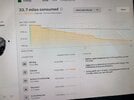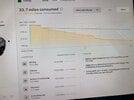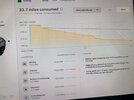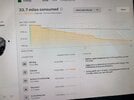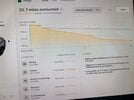We live in Phoenix, so it is hot, our 2023 M3 standard range at 80% was getting about the range shown 223 miles during the winter. In the summer we are getting less than half of that, we now get less than 100 miles. The energy app shows that all the energy is lost under climate (only occurs when running A/C, when not running the A/C the range is as expected). Other Tesla owners we know do not experience this. Does anyone else experience significant HOT weather range loss when running the air conditioner. And please, this discussion is not about, I could have got 10 more miles. This is about significant loss of range from 223 miles to less than a 100 miles with no change in driving habits with the only change being running the air conditioner. This is also not about do I run it at 72 degrees, so don't waste time on those subjects, that does have the significant impact for this question. I have an older 2016 Nissan Leaf, and it usually looses about 10 to 15 percent when running the AC at the lowest setting. The Tesla is using 60 to 80 percent of the energy.
Welcome to Tesla Motors Club
Discuss Tesla's Model S, Model 3, Model X, Model Y, Cybertruck, Roadster and More.
Register
Install the app
How to install the app on iOS
You can install our site as a web app on your iOS device by utilizing the Add to Home Screen feature in Safari. Please see this thread for more details on this.
Note: This feature may not be available in some browsers.
-
Want to remove ads? Register an account and login to see fewer ads, and become a Supporting Member to remove almost all ads.
You are using an out of date browser. It may not display this or other websites correctly.
You should upgrade or use an alternative browser.
You should upgrade or use an alternative browser.
2023 M3 air conditioner using 70% of energy
Dr. J
Active Member
Running the A/C with and without RECIRC on makes a significant difference in energy usage. AUTO will adjust RECIRC depending on the circumstances, but it usually ends up closing off outside air, which is much more energy efficient. However, that situation tends to lead to stinky A/C in more humid climes. YMMV.
GtiMart
Active Member
If your car isn't new, the front radiator might be dirty. This impacts AC performance and might make your AC system work quite a bit more. Cleaning it isn't trivial and involves removing the front trunk plus some plastic ducting to access the rad. There are some videos on youtube, or you might prefer to have Tesla do it.
EDIT: Maybe your louvers are broken and don't open, which would also impact AC performance.
EDIT: Maybe your louvers are broken and don't open, which would also impact AC performance.
DuncanM
Member
The RWD LFP battery has to be charged to 100% regularly for the BMS to give an accurate range prediction. Also do you precondition the car prior to unplugging from your AC charger?We live in Phoenix, so it is hot, our 2023 M3 standard range at 80% was getting about the range shown 223 miles during the winter. In the summer we are getting less than half of that, we now get less than 100 miles. The energy app shows that all the energy is lost under climate (only occurs when running A/C, when not running the A/C the range is as expected). Other Tesla owners we know do not experience this. Does anyone else experience significant HOT weather range loss when running the air conditioner. And please, this discussion is not about, I could have got 10 more miles. This is about significant loss of range from 223 miles to less than a 100 miles with no change in driving habits with the only change being running the air conditioner. This is also not about do I run it at 72 degrees, so don't waste time on those subjects, that does have the significant impact for this question. I have an older 2016 Nissan Leaf, and it usually looses about 10 to 15 percent when running the AC at the lowest setting. The Tesla is using 60 to 80 percent of the energy.
ewoodrick
Well-Known Member
What is the Energy Graph telling you?We live in Phoenix, so it is hot, our 2023 M3 standard range at 80% was getting about the range shown 223 miles during the winter. In the summer we are getting less than half of that, we now get less than 100 miles. The energy app shows that all the energy is lost under climate (only occurs when running A/C, when not running the A/C the range is as expected). Other Tesla owners we know do not experience this. Does anyone else experience significant HOT weather range loss when running the air conditioner. And please, this discussion is not about, I could have got 10 more miles. This is about significant loss of range from 223 miles to less than a 100 miles with no change in driving habits with the only change being running the air conditioner. This is also not about do I run it at 72 degrees, so don't waste time on those subjects, that does have the significant impact for this question. I have an older 2016 Nissan Leaf, and it usually looses about 10 to 15 percent when running the AC at the lowest setting. The Tesla is using 60 to 80 percent of the energy.
We live in Phoenix, so it is hot, our 2023 M3 standard range at 80% was getting about the range shown 223 miles during the winter. In the summer we are getting less than half of that, we now get less than 100 miles. The energy app shows that all the energy is lost under climate (only occurs when running A/C, when not running the A/C the range is as expected). Other Tesla owners we know do not experience this. Does anyone else experience significant HOT weather range loss when running the air conditioner. And please, this discussion is not about, I could have got 10 more miles. This is about significant loss of range from 223 miles to less than a 100 miles with no change in driving habits with the only change being running the air conditioner. This is also not about do I run it at 72 degrees, so don't waste time on those subjects, that does have the significant impact for this question. I have an older 2016 Nissan Leaf, and it usually looses about 10 to 15 percent when running the AC at the lowest setting. The Tesla is using 60 to 80 percent of the energy.
Post the energy screen from the car showing that climate control is using 60% of the energy.
===============================
(moderator note)
Also, when you post a thread, you do not get to dictate what people respond with. You have a lot of "dont talk about X" stuff in there and you dont get to dictate that.
So this would drop my range from 223 to 100? Did you reproduce this with your vehicle where you RECIRC or don't and the range changes ?Running the A/C with and without RECIRC on makes a significant difference in energy usage. AUTO will adjust RECIRC depending on the circumstances, but it usually ends up closing off outside air, which is much more energy efficient. However, that situation tends to lead to stinky A/C in more humid climes. YMMV.
As Stated, this is a new vehicle. so this answer does not apply.If your car isn't new, the front radiator might be dirty. This impacts AC performance and might make your AC system work quite a bit more. Cleaning it isn't trivial and involves removing the front trunk plus some plastic ducting to access the rad. There are some videos on youtube, or you might prefer to have Tesla do it.
EDIT: Maybe your louvers are broken and don't open, which would also impact AC performance.
The RWD LFP battery has to be charged to 100% regularly for the BMS to give an accurate range prediction. Also do you precondition the car prior to unplugging from your AC charge
This is commonly known, charge the LFP pack to 100% weekly - this is stated directly on the screen to do so. The only difference in the equation is the AC running or not running. The vehicle charges overnight on the home charger. During the winter months in phoenix we did not run the AC much, so the only difference here is running or not running the AC. The mileage is stated correctly with there are no battery or BMS issues that are a factor to the problem we are facing.
E90alex
Active Member
Where are you looking that it’s showing the range?
Are you taking a lot of short trips after parking in the sun?
Are you taking a lot of short trips after parking in the sun?
Example : Drive : 9.2 mile , 33.7 miles consumed, 20.4 used by AC (Climate), If I turn the AC off then miles consumed are within the expected consumed with all other factors considered ( elevation, everything else).What is the Energy Graph telling you?
Attachments
Thanks for your recommendations. The attempt was to reduce noise unrelated to the question asked, this it is not about Charging, BMS or Battery degradation, it is about the AC energy consumption. Thank you.Post the energy screen from the car showing that climate control is using 60% of the energy.
===============================
(moderator note)
Also, when you post a thread, you do not get to dictate what people respond with. You have a lot of "dont talk about X" stuff in there and you dont get to dictate that.
Attachments
Lindenwood
Active Member
The AC system maxes out at about 7kw (and probably averages more like 3kw even in hot climates).
If you are driving on the highway expending 250wh/mile, then going 100 miles would use 25kw, or about 50% of the available 55kwh battery (not counting overhead). At 75mph, this is 1.33 hours, and the AC couldn’t possibly use more than ~10kwh, or about 20% of the available battery.
Bottom line, if you are charging to 100% and getting 100 miles of predicted range, it is something other than than the AC causing the huge drain.
If you are driving on the highway expending 250wh/mile, then going 100 miles would use 25kw, or about 50% of the available 55kwh battery (not counting overhead). At 75mph, this is 1.33 hours, and the AC couldn’t possibly use more than ~10kwh, or about 20% of the available battery.
Bottom line, if you are charging to 100% and getting 100 miles of predicted range, it is something other than than the AC causing the huge drain.
Does not matter if it is long or short trip range is reduce by more than double, car is parked undercover. See attached from Energy App, if you test drive your vehicle 10 miles (extremely Hot, and you set you air conditioner to "LO", do you consume 35 miles of range after driving only 10 miles? (My 2016 Nissan leaf consumes 13 miles under the same conditions. )Where are you looking that it’s showing the range?
Are you taking a lot of short trips after parking in the sun?
Attachments
ewoodrick
Well-Known Member
I know that it's been really hot out your way for at least the last week, but that does look to be excessive.
I'd probably open a Service Request.
I'd probably open a Service Request.
TornadoTJ
Member
We road tripped our 2023 M3 LFP over the weekend. We have been experiencing over 100 degree weather here, for example yesterday was 108. We noticed our range was way down. I forget what the efficiency scores were, but it was certainly using a lot more juice per mile than normal.
If we don't use the AC, then we get the range expected - about 200+ miles at 80% charge, the only difference being that when using the AC , the range drops to well under 100 miles. The energy app confirms this (see attached). We know this is not a BMS issue (Charging energy required etc.). The BMS is doing a pretty good job (We are, of course, charging to 100% weekly). If we never used our AC (and severely sweated) we get the expected range. But of course no one can live that way in phoenix. We are taking the car in for service again, we found last time we took it in they never did not do a voltage test on the compressor. What I am really try find out out on this blog is if anyone else is experiencing this. Our Model Y friends do not have this problem. We were told by the service center last time everything was working fine - of course.The AC system maxes out at about 7kw (and probably averages more like 3kw even in hot climates).
If you are driving on the highway expending 250wh/mile, then going 100 miles would use 25kw, or about 50% of the available 55kwh battery (not counting overhead). At 75mph, this is 1.33 hours, and the AC couldn’t possibly use more than ~10kwh, or about 20% of the available battery.
Bottom line, if you are charging to 100% and getting 100 miles of predicted range, it is something other than than the AC causing the huge drain.
Attachments
Thats the magic question - how much...we find some owners are not experiencing this. Trying to find out from others what they experience. Please use the energy app on your vehicle to see how much the AC (Climate) is using - mine is attached. Google it if you have not used it, pretty simple to use.We road tripped our 2023 M3 LFP over the weekend. We have been experiencing over 100 degree weather here, for example yesterday was 108. We noticed our range was way down. I forget what the efficiency scores were, but it was certainly using a lot more juice per mile than normal.
Attachments
What else comes into play when you run the AC (other than the AC?) If the AC is off we get the expected range. I will go drive the car 10 miles unders same condtions, one with AC on and one with AC off and post the energy app this afternoon - please look for it tomorrow and tell me your thoughts. This is going to be a very sweaty drive, but worth showing the difference with simply running the AC or not running the AC.The AC system maxes out at about 7kw (and probably averages more like 3kw even in hot climates).
If you are driving on the highway expending 250wh/mile, then going 100 miles would use 25kw, or about 50% of the available 55kwh battery (not counting overhead). At 75mph, this is 1.33 hours, and the AC couldn’t possibly use more than ~10kwh, or about 20% of the available battery.
Bottom line, if you are charging to 100% and getting 100 miles of predicted range, it is something other than than the AC causing the huge drain.
Similar threads
- Replies
- 57
- Views
- 2K
- Replies
- 4
- Views
- 1K
- Suggestion
- Replies
- 2
- Views
- 526
- Replies
- 9
- Views
- 2K



